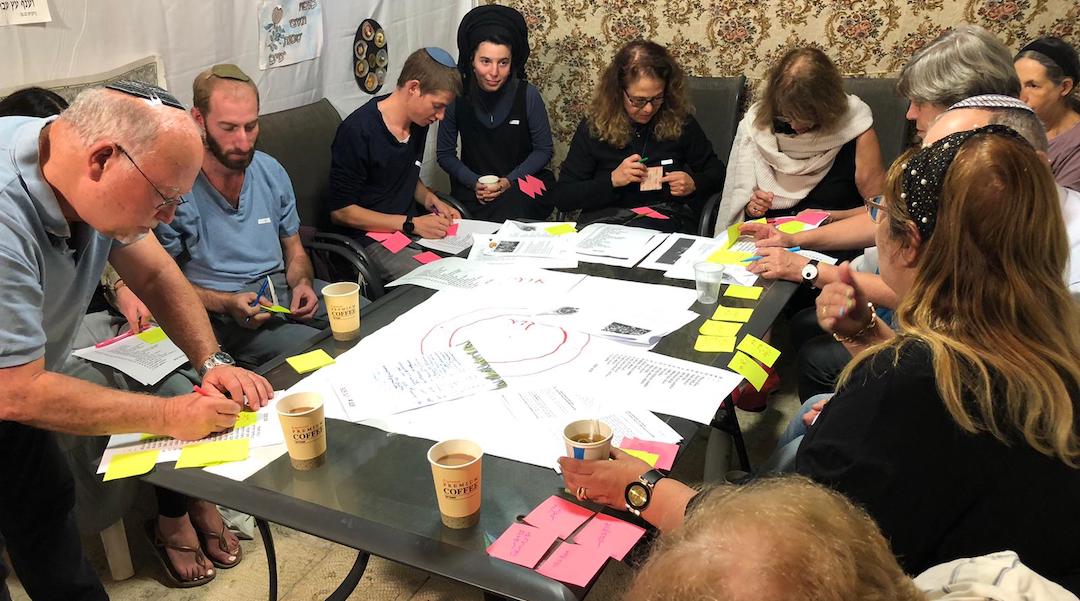An Israeli protest group is inviting strangers to debate politics in their sukkahs
‘We want the public to learn and understand the issues at play here, and not just to learn how to protest,’ one of the initiative’s leaders said

Participants complete an exercise during a dialogue session at an Israeli sukkah as part of the SOS Home project. (Courtesy of SOS Home)
JERUSALEM (JTA) — Every Saturday night, Michal Muszkat-Barkan heads out to the streets of Jerusalem to oppose the government’s effort to weaken the judiciary. As the leader of a protest group called Safeguarding Our Shared Home, she is one of many activists who have brought out hundreds of thousands of Israelis to demonstrate against the judicial overhaul.
But this week, Muszkat-Barkan’s group has been engaging people in another sort of group endeavor — aiming not to persuade or demonstrate, but to listen to differing views across the political and religious spectrum.
The initiative is tied to the weeklong fall festival of Sukkot, in which Jews traditionally eat meals with guests in sukkahs, outdoor huts constructed for the holiday. Muszkat-Barkan’s movement, abbreviated as SOS Home, has enlisted more than 250 people across Israel to open their sukkahs to strangers, inviting Israelis from all walks of life to engage in dialogue on some of the key issues plaguing the country today — including but not limited to the judicial overhaul.
“We want the public to learn and understand the issues at play here, and not just to learn how to protest,” Muszkat-Barkan, who is a Jewish education professor at Hebrew Union College, told the Jewish Telegraphic Agency.
“Sukkot is a time when we leave our safe spaces,” she added. “You feel everything more – the cold, the heat, the rain — and there’s an underlying symbolism there. There’s also the idea of… inviting guests who aren’t immediate family, and here we’re inviting people that we wouldn’t otherwise necessarily talk to.”
SOS Home organized the project with 929, an Israeli Bible study initiative that was similarly founded to engage people across demographics in a shared Jewish activity. People who sign up for the project get matched with a sukkah, where a facilitator guides the group through conversations on Israel’s political and social issues, in addition to what it means to be Jewish and Israeli.
Participants are asked to ponder what the past 10 months — during which Israeli social strife has spiked — have meant to them. If there was one guest, either living or from the past century, whom they could invite to their sukkah, who would it be? What do they think about the judicial overhaul? What does it mean for Israel to be a Jewish and democratic state?
The group has trained more than 100 facilitators to lead the discussions taking place in the sukkot, including famous Israeli musicians such as Ivri Lider and Berry Sakharof and liberal politicians and activists including Yaya Fink and Yuli Tamir. The list of facilitators also includes liberal religious Zionist Rabbi Benny Lau, who leads 929, and at least one prominent right-wing figure who supports the judicial overhaul, former Likud lawmaker Yehuda Glick. The sessions include “people calling to end the occupation alongside settlers,” Muszkat-Barkan said.
Several of the hosting sukkahs are in West Bank settlements, while others are hosted by members of cohorts of religious Jews who have moved into urban centers. Sarah Eliash, a former high school principal from the northern West Bank settlement of Kedumim and a political activist who is pushing for compromise on the judicial legislation, was a guest at one of the sukkahs.
“I certainly don’t share political ideologies with many of the others, but I will never dismiss them. We live here together and we need to find a way to straighten out our differences,” Eliash told JTA.
Muszkat-Barkan sees a continuum between the protest movement and the dialogue initiative her group is now leading. At the demonstrations, she said, the group has extended invitations to representatives of minority communities, including Ethiopian, Russian and haredi Orthodox Israelis. They have also invited Reform and Conservative Jewish leaders.
“No doubt that a lot of people won’t believe that a protest movement can also call for dialogue,” she told JTA. “But anyone who knows us knows that from the very first moment, that’s what we’ve called for.”
She added, “A lot of people say, your voice is one that we need. On the one hand, a voice of protest, of preserving democracy and a separation of powers, and on the other, a voice calling for a mechanism of broad consensus.”
She also isn’t concerned that opponents of the judicial overhaul will come to support the legislation after the dialogue sessions, though she said any participant “may arrive at different conclusions than those he entered with.”
“I’m not concerned that people who thought the reform was bad for Israel will now leave and be convinced it’s a good thing, but yes, they may leave thinking there’s a way forward for dialogue and agreement,” she said. “It’s really essential.”
Although this initiative was planned well before the start of the fall Jewish holiday season a few weeks ago, it gained added urgency for Muszkat-Barkan following Yom Kippur, when clashes broke out between secular protesters and worshipers at public prayers organized by an Orthodox outreach group in Tel Aviv. “This wasn’t a reaction to what happened on Yom Kippur because it was organized long before that, but in hindsight it stood as a kind of response,” she said.
“People are hurting badly,” she added. “They are angry at the leadership which is pushing us to hate one another. By and large, Israeli society is a very warm one but our leaders are trying to build walls between us. It’s a historical travesty.”
This article originally appeared on JTA.org.












